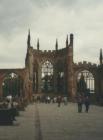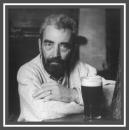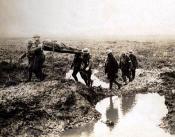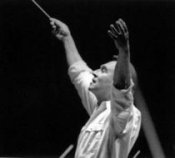Down the close, darkening lanes they sang their way
To the siding-shed,
And lined the train with faces grimly gay.
Their breasts were stuck all white with wreath and spray
As men's are, dead.
Dull porters watched them, and a casual tramp
Stood staring hard,
Sorry to miss them from the upland camp.
Then, unmoved, signals nodded, and a lamp
Winked to the guard.
So secretly, like wrongs hushed-up, they went.
They were not ours:
We never heard to which front these were sent.
Nor there if they yet mock what women meant
Who gave them flowers.
Shall we return to beatings of great bells
In wild train-loads?
A few, a few, too few for drums and yells,
May creep back, silent, to village wells
Up half-known roads.
To the siding-shed,
And lined the train with faces grimly gay.
Their breasts were stuck all white with wreath and spray
As men's are, dead.
Dull porters watched them, and a casual tramp
Stood staring hard,
Sorry to miss them from the upland camp.
Then, unmoved, signals nodded, and a lamp
Winked to the guard.
So secretly, like wrongs hushed-up, they went.
They were not ours:
We never heard to which front these were sent.
Nor there if they yet mock what women meant
Who gave them flowers.
Shall we return to beatings of great bells
In wild train-loads?
A few, a few, too few for drums and yells,
May creep back, silent, to village wells
Up half-known roads.
envoyé par Bartleby - 22/11/2011 - 14:47
×
![]()









In "Wilfred Owen. The complete poems and fragments”, a cura di Jon Stallworthy, 1983.
Musica di Gary Bachlund, cantante lirico e compositore che vive tra Los Angeles e Berlino, dalla sua “Songs of War”, sette canzoni per baritono e pianoforte (2004).
Dopo aver conosciuto gli orrori della Grande Guerra, Wilfred Owen – che era sopravvissuto all’esplosione di una granata di mortaio, che si era risvegliato tra i resti smembrati di un ufficiale suo amico, che poi era rimasto intrappolato per giorni in una trincea nemica… – trascorse qualche mese nell’ospedale Craiglockhart di Edimburgo per riprendersi dai traumi fisici e psicologici subìti. Lì Owen potè ritemprarsi, scrisse molto e fu felice di ricevere la visita di colui che egli considerava maestro ed ispiratore, il poeta Siegfried Sassoon.
Ma l’orrore non era finito.
Nel luglio del 1918 Owen tornò in servizio in Francia, anche se aveva avuto la licenza illimitata. La sua decisione fu quasi totalmente dovuta al ritorno in Inghilterra di Sassoon. Siccome questi fu congedato fino al termine della guerra per una ferita alla testa, Owen sentì la responsabilità di continuare a cantare la tremenda realtà della guerra e di occupare il posto al fronte lasciato vacante dall'amico. Sassoon si oppose violentemente all'idea di Owen di tornare in trincea, minacciando di trafiggergli la gamba se ci avesse provato. Incurante di ciò, Owen si fece destinare al Northern Command Depot di Ripon – dove scrisse questa e molte altre poesie, come “Futility” e “Strange Meeting” (che su questa pagine troviamo condensate nel War Requiem di Benjamin Britten) e di lì in Francia, e solo quando fu nuovamente al fronte ne informò l’amico Sassoon. (fonte: it.wikipedia)
Il 4 novembre 1918 Owen fu ucciso vicino ad Ors, nel Nord-Pas-de-Calais, mentre cercava di attraversare il canale di Sambre-Oise.
La notizia della sua morte pervenne alla famiglia l’11 novembre 1918, giorno dell’Armistizio.